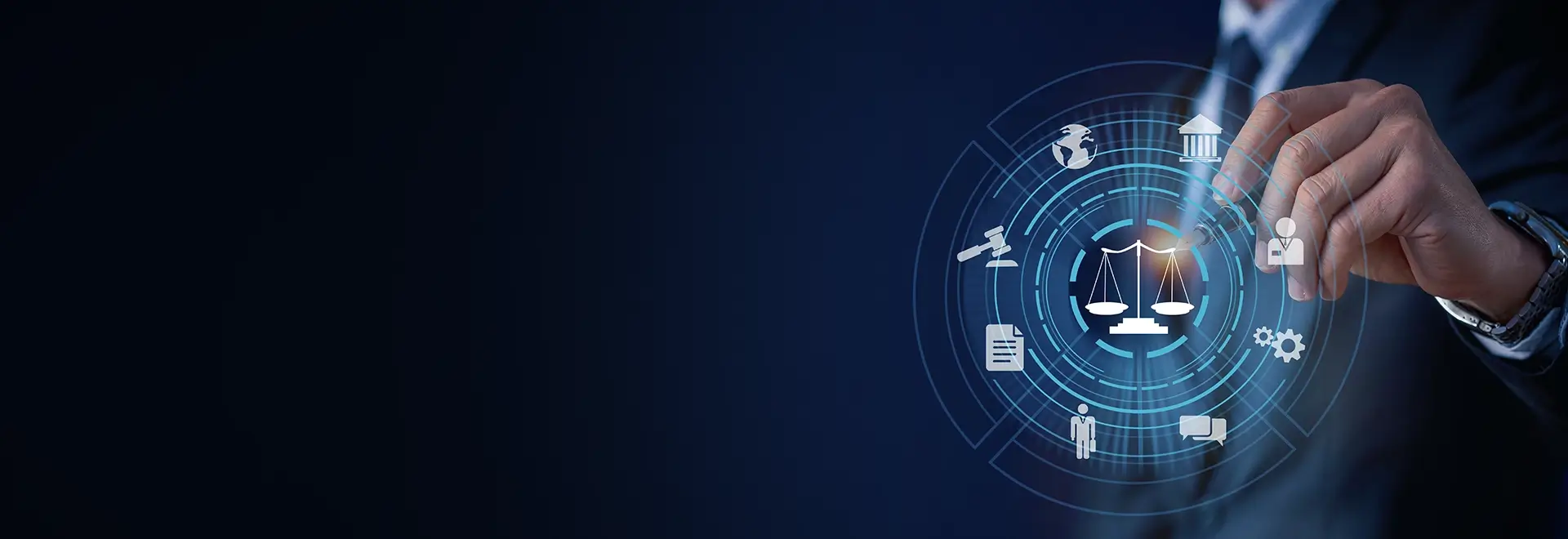- Home
- Academics
- School of Law
- BA/BBA - Disruptive Technologies Law
BA/BBA Disruptive Technologies Law
Program details
The Disruptive Technologies Law (Hons.) program offered by UPES School of Law is a specialized course that focuses on the legal aspects of disruptive technologies. The curriculum is carefully designed to provide students with a comprehensive understanding of the theoretical framework of disruptive technologies in cyberspace. It covers a wide range of topics such as cyber criminology, cyber law jurisprudence, crimes in disruptive technologies, and the legal regulatory framework surrounding them.
The program aims to strike a balance between theoretical knowledge and practical application. To achieve this, the teaching methodology includes interactive tools, classroom lectures, continuous and summative assessments, discussions, seminars, case studies, research projects, and presentations. By engaging in these activities, students are able to apply their theoretical understanding to real-world scenarios and develop the skills necessary to navigate the legal landscape of disruptive technologies.
Key topics covered in the program include Metaverse, Blockchain, Drones laws, Artificial Intelligence, Robotics law, Fin-Tech & e-Commerce, OTT platforms, and Data privacy. Through these subjects, students gain insights into the legal implications of these technologies and their impact on various sectors. Additionally, the curriculum enables students to compare and analyze Indian regulatory policies with those of other countries such as the USA, UK, EU, and many others, where laws in this field are rapidly evolving.
Program Highlights
- The Disruptive Technologies Law (Hons.) program offers specialized papers that cover a wide range of disruptive technologies, including Metaverse Blockchain, Drone Laws, AI & Intelligence Robotics Law, Fintech & E-Commerce, Cyber laws & Cyber Security, Data Privacy & Law relating to OTT and Social Media, Connected & Autonomous Vehicles & Smart Cities.
- The curriculum is designed to address the legal frameworks and challenges surrounding disruptive technologies, preparing students to navigate the complex legal landscape of hi-tech advancements.
- Students gain practical knowledge and understanding of how disruptive technologies interact with legal frameworks, enabling them to analyze and apply the law to real-world scenarios.
- The Disruptive Technologies Law (Hons.) program emphasizes the latest industry trends and developments, ensuring that students are equipped with the necessary skills and knowledge to address legal issues in the rapidly evolving technology sector.
- The program goes beyond traditional legal studies by integrating multiple domains, enabling students to develop a holistic understanding of disruptive technologies and their legal implications.
- Graduates of this program are well-positioned to pursue careers as technology law experts, advising businesses, government agencies, and organizations on the legal aspects of disruptive technologies and helping shape the future of the industry.
Future Scope / Industry Trends
The future scope of the Disruptive Technologies Law (Hons.) program is promising due to the increasing concerns surrounding data privacy and protection. With disruptive technologies collecting and processing personal data, the industry is focusing on developing robust data protection laws and frameworks to ensure responsible data handling practices and safeguard individual privacy rights. The regulation of Artificial Intelligence (AI) is another significant area of focus. As AI is deployed across various industries, legal and ethical dilemmas arise. Industry trends involve formulating regulations and guidelines to address AI-specific legal issues such as transparency, accountability, bias mitigation, intellectual property rights, and liability for AI-related decisions. Blockchain technology and cryptocurrencies have disrupted traditional financial systems, leading to the establishment of regulatory frameworks. These frameworks govern blockchain-based transactions, initial coin offerings (ICOs), cryptocurrency exchanges, and anti-money laundering measures. The industry strives to strike a balance between fostering innovation and ensuring consumer protection. In the realm of cybersecurity, the strengthening of laws and regulations is paramount. Disruptive technologies are vulnerable to cyber threats and data breaches. The industry is focusing on developing cybersecurity laws, incident response mechanisms, and regulatory frameworks for reporting and managing data breaches.
Career Opportunities
Completing the Disruptive Technologies Law (Hons.) program offered by UPES School of Law opens up a plethora of exciting career opportunities in the ever-evolving field of technology law. Graduates are well-equipped to navigate the legal challenges presented by emerging technologies such as artificial intelligence, blockchain, cybersecurity, and data privacy. They can pursue diverse roles as technology lawyers, legal consultants for tech companies, policy analysts, intellectual property specialists, or compliance officers in both private and public sectors. With their specialized knowledge of disruptive technologies and their legal implications, these graduates are poised to make significant contributions to the digital transformation of industries and societies, ensuring ethical, responsible, and legally compliant technology adoption.
Placements
The Disruptive Technologies Law (Hons.) program offered by UPES School of Law provides an exceptional platform for students to specialize in the dynamic field of disruptive technologies and its legal implications. This cutting-edge program equips students with a deep understanding of emerging technologies such as artificial intelligence, blockchain, and robotics, and their intersection with legal frameworks. With a strong emphasis on practical skills and experiential learning, UPES School of Law ensures that graduates of this program are well-prepared to address legal challenges posed by disruptive technologies in various sectors including cybersecurity, intellectual property, privacy, and e-commerce. The program's comprehensive curriculum, industry collaborations, and dedicated faculty enable students to acquire a competitive edge in the job market, opening up diverse opportunities in law firms, technology companies, regulatory bodies, and consulting firms at the forefront of technological innovation.
Fee Structure
Click here for detailed Fee Structure.
Eligibility
Interested students must meet the minimum eligibility criteria for Disruptive Technologies Law (Hons.), which are as follows: Minimum 50% Marks at Higher and Senior Secondary level (X and XII).
Selection Criteria
The selection process for students interested in studying Disruptive Technologies Law (Hons.) at UPES relies on the individual's performance in ULSAT / CLAT / Board Marks / CUET.
Suggested Videos
